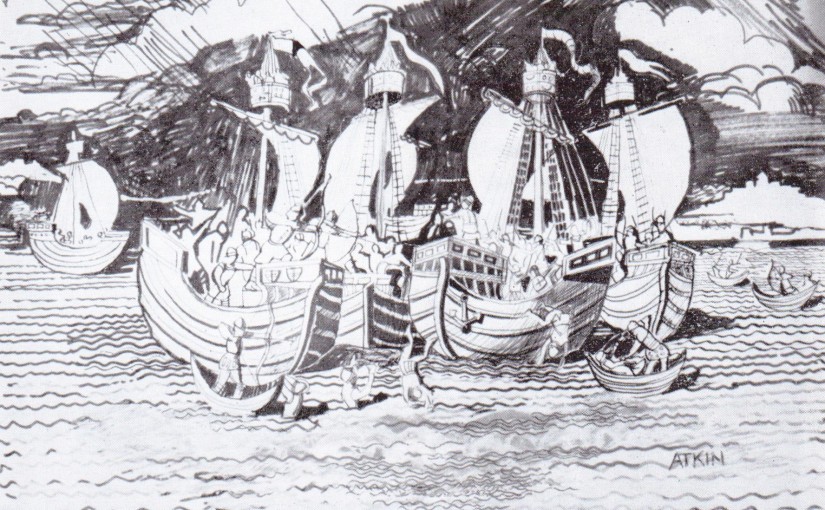The 1840 Sussex Directory claimed that Hastings was the head of the Cinque Ports Confederation before telling us it was a Corporate and Parliamentary Borough, demonstrating the importance still placed in the Cinque Ports heritage at that time, even though the Kent & Sussex fleet’s days of glory were well over by the time of the Spanish Armada, when just twelve vessels from the Cinque Ports were represented in Drake’s fleet.
Hastings and St. Leonards were rapidly increasing in popularity. There were excellent provisions for sea-bathing; the Marine and Pelham Baths were favourites of the ever growing band of celebrities that visited the town enjoying the excellent air; libraries, hotels and lodging-houses of the fashionable town.
Horse Races had been established at Hastings in 1827, assemblies, concerts and regattas all helped swell the ever growing popularity of the East Sussex resort. 1840 was a splendid year, it was a time of comparative peace and on 10 Feb 1840 Victoria married Albert. A veritable love match, the young Queen and her German husband were devoted to each other. Albert popularised many German traditions that became English favourites, such as the Christmas tree.
1840 was the year the ‘Penny Post’ was introduced in England. Philatelists will tell you that a penny would have bought a ‘penny black stamp’ and that the early ones are worth a bit more than a penny now! That very fine musical instrument the ‘clarinet’ was invented in Germany by Johann Cristoph Denner and in that same year British settlement of New Zealand commenced.
Many will be surprised to hear that in this year, 1840, Lucretia Mott and Elizabeth Cady Stanton called the first women’s rights convention in London. It was also the year that the ‘Houses of Parliament’ were completed. Architects Barry and Pugin were responsible for the Gothic style of the new Houses of Parliament. Animal lovers will be interested that the SPCA, the Society for the Prevention of Cruelty to Animals gained royal approval becoming the RSPCA. The English are famous for their love of animals and the RSPCA was the first animal protection society in the world, dedicated to changing public indifference to cruelty against animals, appointing inspectors and prosecuting people guilty of cruelty.
Hastings was in the thick of it all, rivalling Brighton at times as the place to spend leisure time.
Back to the Cinque Ports; the original list of privileges was as follows:-
‘exemption from Tax and Tallage, Sac and Soc, Toll and Team, Blodwit, Fledwit, Pillory and Tumbrill,
Infrangentheof, Outfrangeneof, Mundbryce, Waifs and Strays, right to Flotsam, Jetsam or Legan, Privilege of Assembly as a guild, Rights of Den and Strond, and Honours at Court’
Almost incomprehensible to the modern reader, the rights gave the Portsmen full self-government allowing them the organisation of their own taxation and legal affairs. The Portsmen had their own courts, could judge and punish criminals, levy tolls and claim any wreckage found in the sea or on shore. Their special honours at court gave them the right to carry a canopy over the King at his Coronation and sit at his side at the Coronation Feast. In addition they controlled the yearly Yarmouth Herring Fair, a tradition which brought them into frequent conflict with the Portsmen of Norfolk.
The Cinque Ports reached the peak of their power in the 13th Century, acting on many occasions for the King but also suffering some disgrace for unofficial piracy, robbery and pillage that had become commonplace activities of many of the Portsmen.
In the fourteenth century however, the ports began to decline as changes in the local coastline caused many Cinque Ports harbours to become unnavigable or even in some cases completely landlocked. In 1588 the Cinque Ports fleet carried out its last action against the Spanish Armada. In 1663 the Cinque Ports bailiffs made their final appearance at the Yarmouth Herring Fair.
Such rights and privileges gave considerable power in the Medieval World and made the Portsmen difficult to control.
Hastings, as the chief of the Cinque Ports, was bound to provide, at forty days notice, twenty-one vessels for the king’s service, loaded with provisions, arms and fighting men, they were charged with maintaining them for a fortnight after which time, if their services were still required, further costs were born by the Crown.
Hastings Harbour was a secure anchorage for ships until, in the Reign of Elizabeth I, a severe storm destroyed the pier. By this time ships were of a larger draft and were using the deep water ports of Plymouth and Southampton. The Royal Navy came into being and the Cinque Ports Fleet was no longer called upon.
Many of the rights were retained, some even to this day, although now the Ports’ are more ceremonial than practical, the history is, however, of great use to all of them in their efforts to attract visitors.
By 1840 this was very much the case and Victorian tourists were made aware of the town’s great importance in the 400 years when ships were built, fitted and manned for the King’s use against the enemies of the Crown.
“Hastings Town” March 2008
All articles, photographs and drawings on this web site are World Copyright Protected. No reproduction for publication without prior arrangement. © World Copyright 2015 Cinque Ports Magazines Rye Ltd., Guinea Hall Lodge Sellindge TN25 6EG
